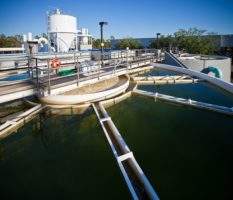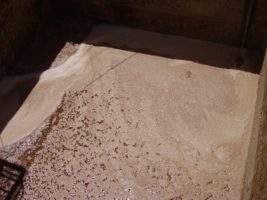EcoCatalysts Wastewater Treatments for the Food Processing Industry

EcoCatalysts provides effective, economically beneficial and environmentally friendly treatments for wastewater in the food processing industry. Our non-toxic treatments are recognised globally as an alternative solution to harsh chemicals for the advanced treatment of water, soils and air.
We offer a range of high-performance bio-organic catalysts to provide the food processing industry with effective wastewater management.
Our bio-organic catalysts are unique and are categorised according to four key actions.
- Biologically-derived catalysts that result in solubilising organic matter
- Surface-modifying compounds that increase dissolved oxygen
- Carbon activation platforms that self-organise the components for a more efficient biological reaction
- Supplements and trace elements for a healthier bacterial metabolism
Elimination of fats, oils, greases and odour
EcoCatalysts has designed the EcoCatalyst bio-organic catalyst specifically for the elimination of fats, oils and greases that cause blockages in drains, collection and septic systems. Our EcoCatalyst bio-organic catalysts eradicate odour and maintain free-flow in:
- Sewers
- Grease traps
- Drains
- Garbage disposals
- Wet wells
- Pump stations
- Septic systems
EcoCatalyst rapidly solubilises organic contaminants, including fats, oils and greases, and aids filamentous bacteria control. Our bio-organic catalyst eliminates hazardous gases and noxious odours and use of our EcoCatalyst bio-organic catalysts in sewers, lagoons and aeration tanks will increase the amount of dissolved oxygen.
Our EcoCatalyst bio-organic catalysts are a cost-effective solution for wastewater treatment in food processing plants, municipal reticulation systems and industrial and commercial cleaning.
Application of bio-organic catalysts
Dilation rates vary depending on water flow volumes and turbulence; for metered pumps, 1ppm of EcoCatalyst can be used in high-flow collection systems and a higher concentration of EcoCatalyst is recommended under low-flow conditions.
Applications with power washers and hoses require 30ml of EcoCatalyst to 4l of water, with 30ml of EcoCatalyst to 1l of water needed for hand sprayers and water buckets.
In applications where drains or grease caps are present, we advise that EcoCatalyst is injected through a high-pressure spray system, or injected so that it takes advantage of the location’s hydrodynamics.
Environmentally friendly bio-organic wastewater treatment
Occupational, health, safety and environment (OHSE) concerns can be alleviated with our bio-organic treatments as their properties include:
- Non-toxic
- Non-caustic
- Non-corrosive
- Non-irritating
- Hypoallergenic
- Bacteria-free
- Biodegradable
In contrast with the limited oxygen transfer of conventional organic catalysts, our bio-organic catalysts are self-organising and create microbubbles with high oxygen transfer characteristics.
EcoCatalysts’ bio-organic catalysts are made from a plant- and mineral-derived fermentation supernatant and have a non-iconic surfactant and stabilisers.
We provide bio-organic catalysts that can be used for a range of wastewater treatment applications, including:
- Elimination of fat, oil and grease issues
- Reduced power cost in aeration
- Reduced sludge volumes
- Reduced BOD, TSS and nitrogen discharges
- Odour elimination in plant, sludge and surrounds
Green and sustainable technologies
EcoCatalysts was formed on World Environment Day in 1996 and is an investment vehicle for green and sustainable technologies. We continue to focus investments on bio-organic catalysts, sustainable agriculture, organic fertiliser and renewable energy.
Products and Services
Video
Related Projects
Press Release
Organic catalysts are highly concentrated, with a completely non-toxic liquid formulation, and are either injected directly into wastewater streams or deployed through spray or fogging systems.
Read moreOrganic catalysts improve environmental waste treatment in a number of critical maintenance and processing areas.
Read moreOrganic Catalysts have undergone extensive and independent testing, showing the highest safety for human, animal, and marine life. Organic Catalysts are non-toxic, non-caustic, non-corrosive, non-irritating, hypoallergenic, bacteria-free and biodegradable.
Read moreThe potential of using organic catalysts to improve nitrification processes is promising due to the oxygen demand required for oxidation of ammonia to nitrate.
Read moreMunicipal wastewater operators are faced with multiple challenges, juxtaposed between regulatory compliance, adequate carrying capacities and operating costs.
Read moreWastewater treatment plants often need to control the 'rotten egg' odours resulting from their waste and sewage treatment processes. The unpleasant odours in and around wastewater plants are mainly caused by H2S, but other odorous compounds can include mercaptans, amines, aldehydes, and ketones.
Read moreIt's estimated that fat, oil and grease causes approximately 70% of blocked drains and related flood damage, necessitating a genuine commercial need to clear clogged drains. But how do organisations manage this without the environmental impact that can be almost as costly as the blockages?
Read moreRegional Offices
Unit 2
33 Kremzow Road
Brendale
QLD 4500
Australia
P.O. Box 1011
Menai Central
NSW 2234
New South Wales
Australia












